Module Descriptions
|
Creating a Team Charter |
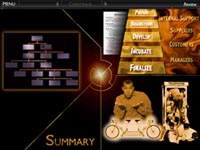 | Teams that fail routinely
attribute troubles to unclear purposes and ambiguous goals.
Teams that succeed consistently have a clear purpose and concrete
goals. What about your team?
• Do you understand what your team is expected to achieve?
• Are the activities of you and your team members focused
and purposeful?
• Does your team have and use clear goals?
This module follows a five-step process that will guide your
team to an effective team charter. Team members discover how
key customers, key results, guiding principles, and time frames
are critical to the creation of an effective charter. In this
module team members build their own foundation for team success.
|
Team Communications Basics |
 | Good communication is crucial to
team success. It helps solve problems, generate ideas, make
decisions, resolve conflicts, clarify expectations, plan projects,
and coordinate schedules. It can also be frustrating and difficult
to achieve.
• Does your team understand and listen to each team
member?
• Are all team members involved in planning and decision-making?
• Are team conflicts resolved in a timely manner?
In this module your team will discover how to send and receive
communications more effectively. They will gain a better understanding
of the communication process, learn how to make their messages
heard and understood, and discover techniques for listening
and understanding others. This module teaches the communication
skills that every team desires.
|
Building a Collaborative Team Environment |
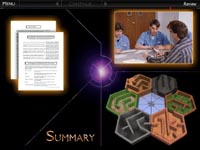 | Collaboration makes it possible
to effectively manage conflict, make consensus decisions,
develop new ideas, solve work-related problems, and improve
work processes.
But before a collaborative team environment is possible, you
must identify and remove barriers.
• Does a high level of trust exist between team members?
• Are the lines of communication within the team open?
• Is there a good balance of task and relationship within
the team?
This module shows your team how to develop a collaborative
team environment. They will learn the value of a common purpose,
trust, clear roles, open communication, diversity, and the
balance between task and relationship.
|
Managing Team Conflict |
 | Why do some teams come together
quickly while others stay grid-locked? The key is usually
the team’s ability to manage conflict. Teams that resolve
conflicts effectively even find conflicts to be a source of
strength and creativity. What role do conflicts play in your
team?
• Do interpersonal conflicts slow team progress?
• Are the issues attacked or do team members focus on
the individuals?
• Does the team use a common process when dealing with
conflict?
In this module your team will learn how team conflicts can
encourage team success. They will analyze various types of
conflicts and see how common mistakes make them worse. Team
members will learn five essential steps to resolving team
conflicts and how to implement them. They will discover how
to harness everyday conflict in ways that will strengthen
their team.
|
Making Group Decisions |
 | Effective teams make timely, high-quality
decisions that foster the commitment of every team member.
• Does your team routinely involve all members in decision-making?
• After your team has made a decision do members still
support it?
• Does your team take a long time to make decisions?
This module leads your team members to discover different
types of decision-making and the most appropriate situations
for each. They learn a seven-step process for reaching team
consensus. This module guides teams in arriving at timely
decisions that can be implemented and supported by all team
members.
|
Understanding Principles and Boundaries |
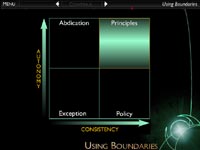 | Restrictive policies can drain
initiative and creativity right out of the work force. Businesses
that guide by principles, on the other hand, produce consistent,
predictable outputs.
• How is your team governed?
• Are organizational policies perceived as restrictive
and unnecessary?
• Do values or rules determine team actions?
In this module team members will examine traditional management
practices, explore an alternative based on shared values,
and assess their team’s current status. They discover
their organization’s prevailing boundaries and learn
how to gain maturity by successively broadening team boundaries.
This module gives teams the organizational insights and techniques
they need.
|
Giving & Receiving Feedback |
 | The quality of coaching for
a sports team can make the difference between victory and
defeat. For a work team, it’s the difference between
business success and failure. Coaches need to know what every
team member does and how well they’re doing it. Nobody
knows your team better than your own team members. How well
are your coaches doing?
• Does each team member know how to coach others to
excel?
• Do team members receive coaching as an opportunity
to develop?
• How helpful is the feedback you’re getting?
This module guides team members in discovering how to coach.
They learn how to correct, develop, and reinforce each other.
They practice techniques that help them to receive feedback
constructively. They gain the confidence and skills they need
to coach and develop their team.
|
Facilitating Team Interactions |
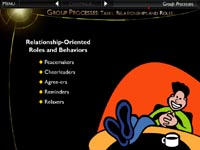 | Approximately 20-40 percent
of an average company’s employment costs involve people
attending meetings. Even when these meetings are efficient—they
are not necessarily effective.
• Do your team meetings follow an agenda?
• Do some team members dominate meeting discussions?
• Do members believe team meetings to be a waste of
time?
In this module team members find out how to conduct and contribute
in effective meetings. They learn specific skills and strategies
for making meetings work. Not only will they see the value
of full participation, they will learn ways to help everyone
take part. Ensure every member of your team knows how to prepare,
facilitate, and participate in effective meetings.
|
Goal Setting and Measuring Results |
 | Becoming the best takes hard
work, informed decisions, and continuous improvement. Teams
need to know exactly where they stand before they can decide
where to go and how to get there.
• Does your team have clearly defined key result areas?
• Does your team use benchmarks to determine performance?
• Does your team set clear measurable goals?
Can each team member explain where the team is heading and
how well it’s doing?
This module guides team members to select key result areas,
identify benchmarks, measure current performance, set goals,
and communicate results. Team members clearly define where
they are and where they need to go. They learn how to use
benchmarks, performance measurements, and communication to
achieve their best.
|
Managing Team Performance |
 | Teams need to respond to changes
and problems quickly and dynamically. Traditionally, guidance
only came from a manager. Today the information they need
flows from every direction.
• Who plans your activities, the team or your manager?
• Does your team regularly review progress?
• Does your team routinely reward results?
This module teaches techniques for self-direction. Your team
will learn how to define expectations, plan, act, review progress,
and reward results. By taking ownership of their work process
and managing their performance, self-directed teams consistently
excel.
|
Planning for Action |
 | Planning can be the most time
consuming part of an activity—and the most rewarding.
How well does your team plan and implement its decisions?
• Does your team find itself "fire fighting"?
• Are plans frequently changed or altered?
• Is it clear who is responsible for specific actions?
In this module your team will learn a five step planning
process. They will discover how to develop comprehensive plans
that cover what to do, who will do it, how to do it, and when
to do it. They will discover the tremendous value of actually
doing what they have planned. This module is a great resource
for every active team.
|
Selecting Team Members |
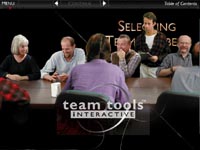 | High-performance teams are
ready to take the initiative in resolving issues and improving
performance. Selecting new team members who will maintain
and strengthen team capabilities, however, requires careful
preparation and full collaboration with managers and Human
Resources representatives.
• Is your team consistently operating at a high level?
• Does the team need to expand?
• Do they understand the process of selecting a new
team member?
This module will help your team know how to define a personnel
need, select candidates, and integrate new team members. They
will learn how to work with managers and Human Resource representatives
to make the best possible decisions.
|
Team Problem Solving |
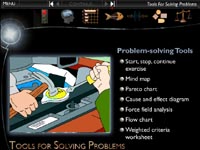 | One size may not fit all.
Different problems often require different kinds of solutions.
Finding those solutions takes skills that every team can use.
• Can your team find the root cause of a problem, or
does it chase symptoms?
• Does your team ignore practical solutions while chasing
the ideal?
• Does the team seek the insights and skills of all
of its members?
In this module your team will identify different kinds of
problems and find appropriate solutions. They will learn how
to recognize problems, determine the real causes, explore
solutions, select the most practical remedy, and implement
that solution.
|
Team Member Roles and Responsibilities |
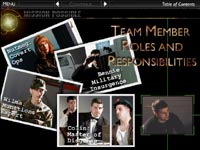 | The work you do defines the
skills you need. Evaluating team member roles and responsibilities
allows your team to adapt to rapidly changing tasks and requirements.
• Are team members’ roles clearly defined?
• Does everyone on your team know what everyone else
does?
When team activities are shared between members, do critical
tasks get "lost in the shuffle"?
This module helps teams recognize the importance of clearly
defined roles. They learn when it’s more productive
to stop and redefine roles than it is to stumble on. Team
members will see how to efficiently analyze work, redefine
and learn new roles, and track their progress.
|
Working with Your Supply Chain |
 | No team is an island. They
depend on their relationships with vendors and customers to
succeed. These relationships can always be strengthened and
should never be taken for granted.
• Do all team members understand customer requirements?
• Does your team routinely communicate with its customers
and suppliers?
• Do team members try to maintain good relationships
with customers
and suppliers?
This module underlines why their supply chain is critical
to team success. They learn how to identify key suppliers
and customers, how to understand their needs, how to communicate
expectations, and how to work together with the entire supply
chain to achieve the best results.
|


